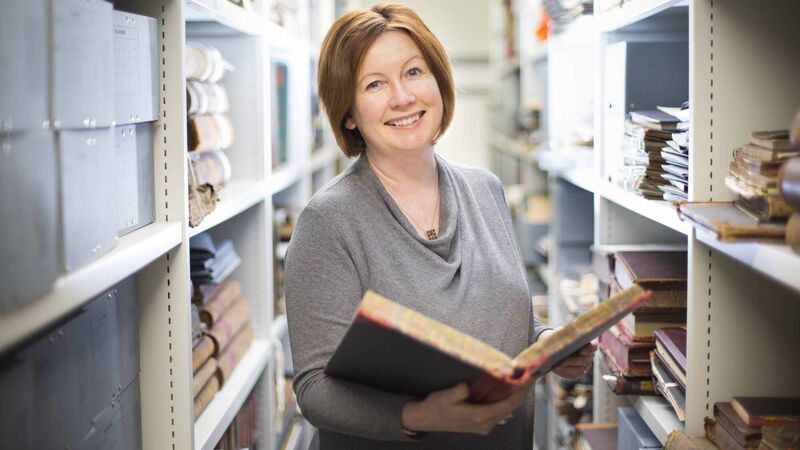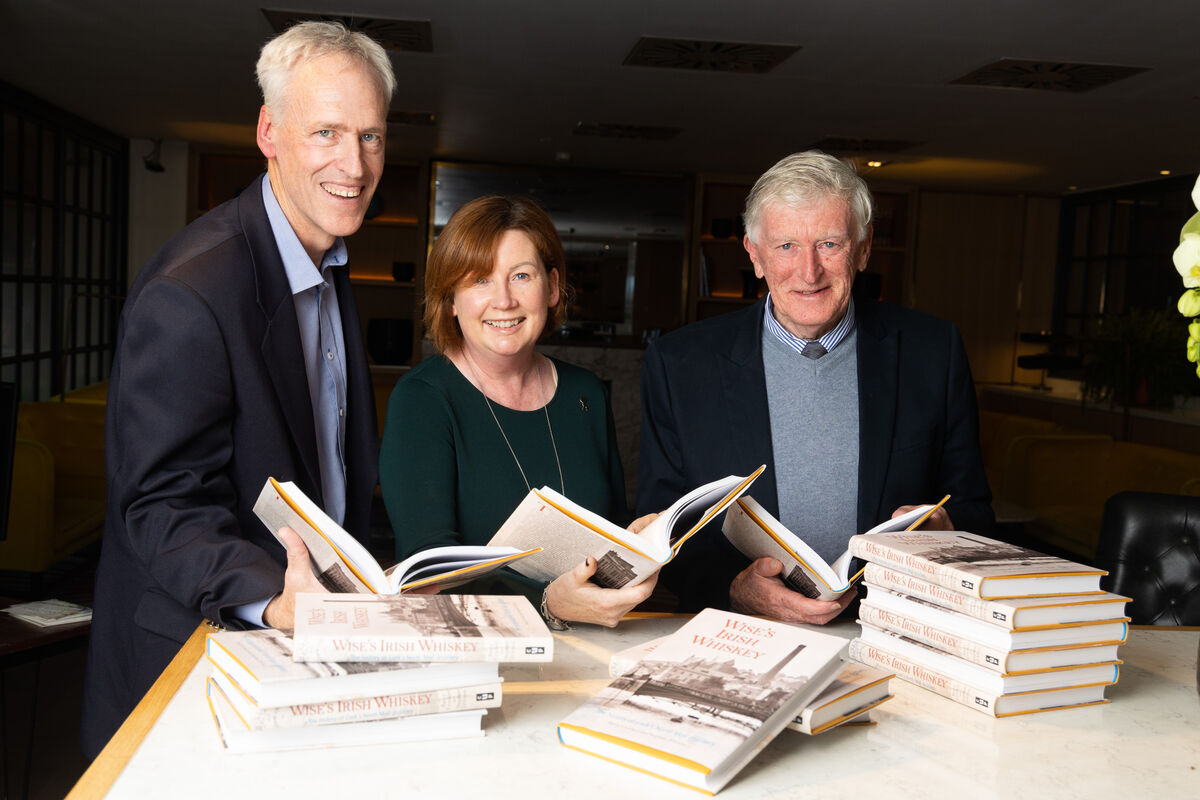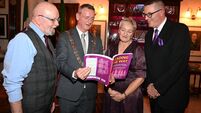Meet Cork’s guardian of Irish whiskey heritage

Carol Quinn is the archivist for Irish Distillers Ltd, (IDL), responsible for all materials documenting 150 years of distilling Irish whiskey in Dublin, Midleton and Cork city, including the famous heritage brands of Jameson and Powers.
IF life is what happens when you’re busy making other plans, who’s keeping a note? These days, we publicly display the archive of our life through social media platforms, but what about the past? What was life for people like 100 years ago?
We often turn to historians to tell those stories, but it’s archivists that are guardians of where those stories come from.
Carol Quinn is the archivist for Irish Distillers Ltd, (IDL), responsible for all materials documenting 150 years of distilling Irish whiskey in Dublin, Midleton and Cork city, including the famous heritage brands of Jameson and Powers.
Eleven years ago, IDL began a project to collect, conserve, preserve, maintain and manage their collection of historical documents. The archive is based at Midleton Distillery Experience in the Distillers’ Cottage overlooking the site’s oldest building, gifting an immediate sense of legacy and history.
“Growing up, I was always interested in history. I did History and Archaeology for my degree, but I didn’t want to teach or be an academic,” said Carol.
She went on to study a postgraduate diploma in Archive Administration at UCD.
“That offered me a route to be qualified as something. Archivists are not doing research into history, you’re the guardians of the raw materials of history - all the records created by individuals and companies in the normal course of their day-to-day life that we preserve for its unique information value.”
Carol returned to UCC working with a variety of university records such as estate records, literary collections, and documents relating to socio-economic events. When the position at IDL came up, she viewed it as an opportunity to challenge herself in an unfamiliar sector.
“About 12 years ago, during a large expansion period [at IDL], there was an acknowledgment that Irish distilling, and Midleton Distillery in particular, had an incredible past and a legacy that the company had a responsibility to look after.”
“There were records lying around in various warehouses surviving by chance. I was approached to give some guidance to the project, and thought this would be something I’d be very interested in.”
The first task was to bring all the documents together in one place. A specialist company was brought in to survey every nook and cranny where records could be hiding.
“Once we knew what we had, the decision was taken to keep the history here because we wanted to use it as an ongoing asset for the business,” explains Carol.
Part of the historic Distiller’s Cottage was converted into an archival repository – a series of strong rooms where records are stored in temperature- and humidity-controlled conditions, UV filtered lights, and a bespoke fire suppression system.

“Items that were surviving by chance, we were no longer willing to take a chance with. My skillset aided in the design and the layout of the archival repository.”
But before any document could go into the repository, there was the small matter of cleaning, checking, and conserving every item stacked on 45 pallets that arrived at Midleton.
“The first job was to unpack those pallets, clean documents that had been stored in very dirty, dusty environments and hadn’t been looked after. Nothing was moved into the repository until it had been cleaned and checked for things like insects.”
Once an item is placed in the archive, it stays there. Every time something is taken out, deterioration happens. If someone wants to access it, they must come to the reading room at the archive. But not everything is preserved – space is the primary issue, but a key skill of an archivist is recognising what is unique, what might be held elsewhere. or a publication with many duplicate copies.
“I select based on the unique information value of something so we can use the space for something that is unique, like our Wage Books. I can be quite dispassionate about managing things, but I can be passionate about sharing the stories I find.”
Those stories are what Carol refers to as “flashes of humanity” reminding us that the day-to-day lives of people a hundred years ago are no different to ours today.
“Sometimes, you look at a record and there’s a doodle. In a record book from Watercourse Distillery which was in Cork city in the 1830s, the accountant is looking out the window, there are farmers delivering grain and being paid. He doodles their faces.
“Another from the Cork Distilleries Company in 1836, which had their headquarters on Morrisons Island. It’s obviously raining, and there’s a guy on the quays selling umbrellas and he doodles the pedlar. Immediately you’re there - a person a bit bored with doing the books and just doodling!”
Those flashes of humanity can illuminate extraordinary times for ordinary people, too. Carol shows me a large, leatherbound wage book with the name of every worker from the Bow Street distillery in Dublin on one side and their daily wage recorded alongside. But on a particular day during a bitter period of fighting, when it was too dangerous for employees to get to work, a pencil note at the top of the page reads that all workers were paid their daily wage. At a time when the law of the land was no work, no pay, the distillery stood with their employees and paid them anyway.
The archive itself is not open to the public but maintained as an asset to IDL and accessed by different parts of IDL business, including HR, who look to the kinds of values that are important to keep in mind as expansion continues apace.
“As the company grows, we don’t want to lose sight of what made us unique and successful in the first place. Our values - real, remarkable, and responsible - are based on actual historic ways of working. The archive supports our HR function and our culture in giving practical examples of ways of working that we want to carry on into the future.”
Carol’s role as archivist sits within different brand teams who look to historical mash bills and production ledgers for inspiration for contemporary spins on old ideas and methods.
“In 2022, we brought out Jameson Single Pot Still. When the [distilling] teams visited, they realised that for most of its life, Jameson had been a single pot still. The brand we see today in the signature green bottle only first emerged in 1968 as a blend.
“That was the inspiration to bring out a modern, contemporary version of single pot still Jameson, and they wanted to look at the older packaging,” explains Carol. It was something that the archive was able to provide thanks to its rich library of historical labels for bottles.
The archive emphasises how deep the roots go for IDL brands like Jameson and Powers in Ireland.
“We talk about brands, about distilleries, but preserved within the archive are traces of people; the actual physical hands who made the whiskey over generations. Jameson began its life in Bow Street, it was typical to have generations within families working there.
“At any time, you could have a grandfather, father and son, cousins and uncles working together. There is a history to all these people as well that is very important to acknowledge. Within the archive, we have a hundred years of wage books from Bow Street. For the early ones from around the 1860s, this is the only paper record of those individuals: they don’t have a birth cert, there probably isn’t a death cert, so in terms of genealogy they’re hugely important.”
Although the archive’s primary use is to support IDL, in 2022, a million records from within those 100 years of wage books were digitised and placed online in a partnership with Ancestry.com.
“I would always try and answer any genealogical queries, but those 100 years of wage books are available now to search via Ancestry.com. So, we do look at ways of making records that we know have wider public appeal as available as possible.”
Within the records, amongst the doodles of bored workers and casual mentions of civil war, there are stories of when things go wrong (who was blamed for a spoiled distillation process and why), or how the felines of Jameson’s Bow Street distillery garnered a reputation for being excellent mousers thanks to the frequency of petty cash receipts for bread and milk for the cats – “A well fed cat will hunt for fun all day long,” says Carol.
These details are in those records. Carol interprets the pen strokes and pencil scribbles and places them in a context that allows the colour of life to illuminate the dry and dusty pages.
In 2025, Midleton distillery will celebrate its bicentenary; Carol’s current focus is Midleton, 1825.
“It was a bustling town for trade. The Ballincurra Harbour is a kilometre from here and from where all whiskey exports began their journey. It was that harbour that allowed the international growth of Midleton distillery. Today it’s a little inlet, but it was vital to the story of Irish whiskey.”
There are only 200 archivists working in Ireland today. Recent legislation requires every local authority to have an archivist, but, says Carol, many have not taken up their obligation.
But, while many may think archivists are only found in libraries, museums, academic and public sector settings, there are interesting opportunities everywhere, especially in the private sector, and these business archives are an untapped resource.
“You don’t have to have been in business for hundreds of years: you can be in business for five years and have a history. The first day of trading – did someone note down the day it was? That’s an important milestone and memory in your business and it should be something that every year is celebrated. If you didn’t take the time to write down the date, it’s lost. New and young businesses have a history. Have somebody whose function it is to look after that, otherwise nobody will.”
A love of history isn’t going to swing it for a career as an archivist, says Carol.
“The days of being left alone with your material thinking deep thoughts are long gone! You need to be very organised, have good project management skills and excellent communication skills. Get your qualification, it’ll be the foundation for every decision you make. Network and push the envelope. If you’re good at something, have confidence in yourself and put yourself forward.”
Carol’s favourite whiskey tipple? “If I’m feeling good to myself, a snifter of Powers John’s Lane.”
Midleton Distillery Experience has unveiled a redeveloped visitors’ centre. The visitor experience can welcome more than 200,000 visitors a year and brings together all Irish distillers’ whiskey portfolios including Jameson, Redbreast, Midleton Very Rare, Powers, The Spot Whiskeys, Method and Madness and Knappogue Castle, positioning Midleton Distillery as one of the top tourism attractions in Ireland. See www.jamesonwhiskey.com







 App?
App?


